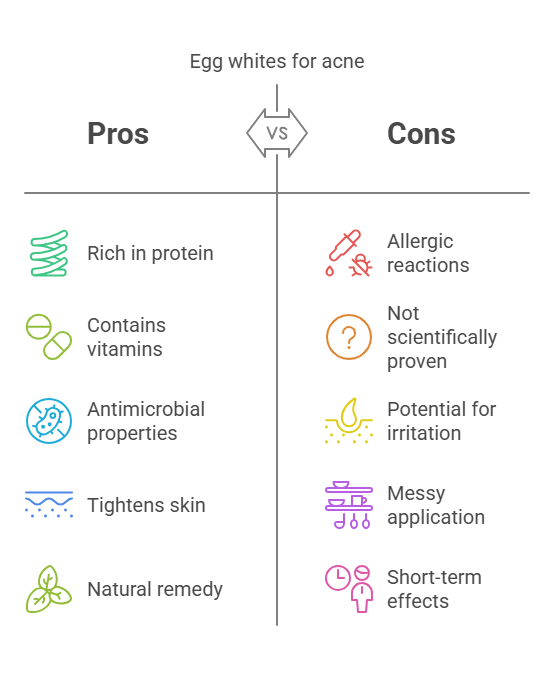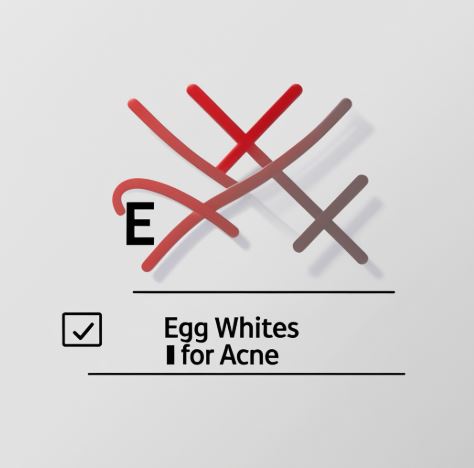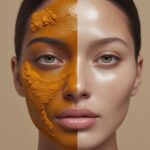Key Takeaways
-
Limited scientific evidence: While some people claim egg whites help with acne, there’s no strong scientific backing.
-
Possible antibacterial properties: Some studies suggest egg whites contain antimicrobial peptides, but research is based on lab tests, not human trials.
-
Potential risks: Raw egg whites carry the risk of Salmonella contamination, skin irritation, and allergic reactions.
-
Dermatologists have mixed opinions: egg whites may help tighten skin temporarily, but most caution against using them for acne treatment.
-
Safer alternatives exist: Proven acne treatments like salicylic acid, benzoyl peroxide, and retinoids offer more reliable results.
Do Egg Whites Help Acne? Science & Dermatologist Advice
Egg whites have long been a popular DIY remedy for acne, with many claiming they help tighten skin, reduce oiliness, and clear breakouts. The idea is simple: egg whites contain proteins and enzymes that may absorb excess oil, shrink pores, and provide an antibacterial effect. But is there any real science behind this, or is it just another skincare myth?
To get to the bottom of this debate, let’s explore what scientific research, real-life user experiences, and dermatologists have to say about using egg whites for acne.

Egg Whites for Acne: Scientific Evidence and Effectiveness
While some people swear by egg whites as a natural acne remedy, scientific evidence supporting their effectiveness in acne treatment is pretty limited. According to a review by Medical News Today, while egg whites might temporarily tighten the skin and absorb excess oil, there is no scientific proof that they effectively treat acne (1).
However, some studies hint at potential benefits. A study published in Molecules explored bioactive peptides derived from egg white proteins and found that they possess antimicrobial properties, which could theoretically help with acne. But the key point? These findings were based on lab studies, not actual human application (2). So while egg whites might have antibacterial components, there’s no direct proof they can fight acne when applied to the skin.
Risks and Reasons to Think Twice
Before you start slathering egg whites on your face, you should know that there are some potential downsides.
-
Salmonella risk – Raw eggs carry the risk of Salmonella contamination, which could be dangerous if it gets into an open wound or near your mouth (3).
-
Skin irritation – Some people may experience redness or irritation from applying raw egg whites, especially those with sensitive skin or egg allergies.
-
Minimal long-term effects – While egg whites might create a temporary tightening effect, there’s no evidence that they provide long-term acne relief.
Should You Use Egg Whites for Acne? Expert Final Verdict
While the idea of egg whites for acne sounds promising, the scientific evidence just isn’t strong enough to support it as an effective acne treatment. If you’re looking for real, research-backed solutions, dermatologist-recommended treatments like salicylic acid, benzoyl peroxide, and retinoids are far more reliable.
That being said, if you love experimenting with natural skincare, just make sure to patch test first and be cautious about potential risks. Your skin deserves the best, so always go with what’s proven to work!
Real People Share Their Experiences (And Some Are Pretty Concerning)
While science doesn’t provide a strong backing for egg whites as an acne treatment, many people have tried it and shared their experiences online. Here’s what they had to say:
-
Mary, a Reddit user from r/Makeup tried applying egg whites on her face but ended up with a mild allergic reaction. She described getting a rash that lasted for nearly three weeks and warned others that the irritation followed the exact areas where she had applied the egg whites. (1)
-
Gerald from Acne.org found the process messy and complained about the unpleasant smell. He also noted that while his skin felt tight after washing off the mask, it left his face uncomfortably stiff for hours. (2)
-
A Reddit user from r/30PlusSkinCare decided against using raw egg whites altogether after considering the risk of Salmonella infection. They pointed out that using raw eggs in skincare isn’t just inconvenient but could be potentially unsafe. (3)
-
Missthingmariah from r/Makeup refused to use egg whites altogether due to concerns about bacterial contamination. The thought of getting sick just wasn’t worth it. (4)
Dermatologists Weigh In: Are Egg Whites Good for Acne?
Dermatologists have mixed opinions on using egg whites as an acne treatment. Some highlight its potential benefits, while others warn about its risks. Here’s what they have to say.
Dr. Dhaval Bhanusali, a dermatologist based in New York, explains that egg whites contain lysozyme, an antibacterial enzyme that targets Propionibacterium acnes—the bacteria responsible for acne. He suggests that the astringent nature of egg whites might help remove impurities, making it a go-to natural remedy for some people.
Dr. Manju Keshari supports this idea, emphasizing that amino acids in egg whites may encourage new skin cell development. She recommends applying whipped egg whites to problem areas, letting them dry, and rinsing with lukewarm water. According to her, regular use could help reduce acne scars over time. (1)
The Risks: What You Need to Know
While some dermatologists see potential benefits, others strongly advise against applying raw egg whites to the skin. Dr. Hadley King warns that raw eggs can carry bacteria like Salmonella, which poses a risk if absorbed through the skin or ingested accidentally. She explains, “There are plenty of safer skincare options that don’t come with the risk of bacterial contamination.”
Dr. Marisa Garshick, another board-certified dermatologist, highlights another concern: allergic reactions. She warns that people with sensitive skin or egg allergies could experience redness, irritation, or breakouts. “It’s best to avoid applying egg whites directly to the skin,” she advises.
Best Natural Alternatives to Egg Whites for Acne Relief
If you’re looking for natural ways to treat acne without the risks associated with raw egg whites, several effective alternatives can help. These options not only target acne but also provide additional skin benefits. Here are five substitutes:
Honey: A Natural Antibacterial Ingredient
Honey is well-known for its antibacterial and anti-inflammatory properties, making it an effective natural remedy for acne. It contains natural enzymes that help kill acne-causing bacteria while soothing inflamed skin. According to studies, honey can also act as a humectant, locking in moisture without clogging pores. This makes it an excellent choice for those with acne-prone but dry skin.
Oatmeal: Soothing and Oil-Absorbing
Oatmeal is packed with antioxidants and anti-inflammatory compounds that help calm irritated skin and reduce redness. It also works as an absorbent, helping to soak up excess oil that can clog pores and contribute to breakouts. Dermatologists often recommend oatmeal-based skincare products for people with sensitive or acne-prone skin.
Aloe Vera: The Ultimate Skin Healer
Aloe vera is famous for its soothing and healing properties. It contains natural antibacterial compounds that can help combat acne while reducing redness and inflammation. the natural skincare ingredient is a gentle alternative to harsher acne treatments, as it hydrates the skin without making it greasy.
Tea Tree Oil: A Natural Spot Treatment
Tea tree oil is one of the most widely studied natural acne remedies. Research has shown that it has powerful antibacterial and anti-inflammatory effects, making it effective against acne-causing bacteria. It works similarly to benzoyl peroxide but is less harsh on the skin, making it a great option for those with sensitive skin.
Turmeric: A Brightening Anti-Inflammatory
Turmeric contains curcumin, a powerful compound known for its anti-inflammatory and antibacterial properties. It helps reduce redness, calm breakouts, and even fade acne scars over time. Turmeric is also used in traditional medicine to promote overall skin health.
Are Egg Whites Worth Using for Acne?
While egg whites are often promoted as a DIY acne treatment, scientific evidence does not support their effectiveness. Although they may temporarily tighten the skin and absorb oil, their potential risks outweigh the benefits, including bacterial contamination, allergic reactions, and skin irritation.
If you’re serious about achieving clear, healthy skin, dermatologist-recommended treatments like salicylic acid, benzoyl peroxide, and retinoids are far more reliable. Additionally, natural alternatives like honey, oatmeal, aloe vera, tea tree oil, and turmeric offer skin benefits without the risks associated with raw egg whites.
Bottom line? While egg whites may seem like an easy, budget-friendly acne remedy, they are not a scientifically proven treatment. If you’re looking for effective solutions, opt for evidence-backed skincare methods that prioritize safety and long-term results.
FAQ: Egg Whites and Acne Treatment
Can egg whites really help with acne?
While some believe egg whites can tighten skin and absorb excess oil, scientific evidence does not support their effectiveness as a long-term acne treatment. Dermatologists caution that the risks outweigh the benefits.
What are the risks of using egg whites on the skin?
Applying raw egg whites can lead to Salmonella contamination, skin irritation, and allergic reactions. People with sensitive skin should avoid it to prevent breakouts and irritation.
What are the best dermatologist-approved acne treatments?
Dermatologists recommend salicylic acid, benzoyl peroxide, and retinoids as proven, research-backed treatments for acne. These ingredients help reduce breakouts, unclog pores, and prevent future blemishes.
Are there safer natural alternatives to egg whites for acne?
Yes! Honey, oatmeal, aloe vera, tea tree oil, and turmeric offer antibacterial and anti-inflammatory benefits without the risks of raw eggs. These ingredients can soothe acne-prone skin and reduce breakouts.
Should I use egg whites if I have acne-prone skin?
Dermatologists generally do not recommend using egg whites for acne. Instead, opt for dermatologist-approved treatments or natural alternatives that have stronger scientific backing.
What Do You Think?
Have you tried using egg whites for acne? Did you experience any benefits or side effects? Share your thoughts in the comments below! Your feedback could help others make informed skincare choices.
Disclaimer
This article is for informational purposes only and is not intended as medical advice. Always consult with a qualified healthcare professional or dermatologist before trying new skincare treatments or making changes to your skincare routine.

I’m a devoted organic skincare enthusiast, passionate about the natural, wholesome goodness that organic products bring to our skin.
Organic skincare isn’t just a hobby for me—it’s a lifestyle. Every product I use, recommend, and write about has been carefully chosen for its purity and effectiveness. Everything I write about is backed by scientific studies, dermatologists’ opinions, and user experiences.
I also excel at tackling skincare challenges with innovative, organic solutions.


